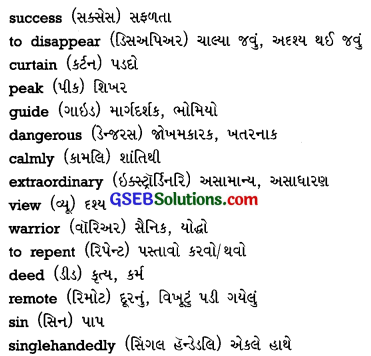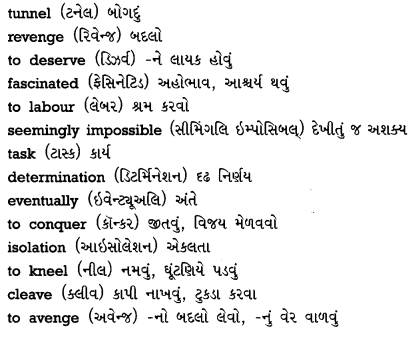Gujarat Board GSEB Solutions Class 10 English Second Language Supplementary Chapter 3 Story Time Textbook Exercise Questions and Answers.
GSEB Class 10 English Textbook Solutions Supplementary Chapter 3 Story Time (Second Language)
Read the passage and answer the questions.
(1) A small talking dog was a big success when it came to a theatre. It told jokes, sang songs and did a lot of other funny items on the stage. But while it was singing a song, a bigger dog came into the theatre, stopped, listened for a few moments and then ran up and jumped on the dog small talking dog and carried it off the stage.
Just as the two animals were disappearing behind the curtains at the side of the stage, the small talking dog said, “I am sorry about this, everybody! This is my mother. She doesn’t want me to be an actor. She wants me to become a doctor.” [Page 11]
Questions :
(1) Why was the small dog a big success ?
(2) What did the big dog do ?
(3) Who was the big dog ?
(4) What did the mother want the small dog to become ?
(5) What did the small dog want to become ?
Answers:
(1) The small dog was a big success because it told jokes, sang songs and did a lot of other funny items on the stage.
(2) The big dog came jumped on the small talking dog and carried it off the stage.
(3) The big dog was the small dog’s mother.
(4) The mother wanted the small dog to become a doctor.
(5) The small dog wanted to become an actor.
(2) A warrior killed his master. He repented immediately but the deed was done and he knew that if he was caught he would be put to death. So he ran away. He reached a remote village that was separated from the rest of the world by a mountain. The murderer decided to repent for his sin by single-handedly cutting a road through the mountain to connect the village with the rest of the world.
He worked from dawn to dusk and in four years had made halfway into the mountain. One morning when he was hard at work in the tunnel, a young man called out to him to come out. He was the son of the man who was murdered. He wanted revenge. “I deserve to die,” said the former warrior. “Kill me by all means but wait until I’ve completed this tunnel.” [Page 12]
Questions :
(1) Why did the warrior repent ?
(2) Why did he run away ?
(3) Where did he reach ?
(4) How did he decide to repent for his sin ?
(5) Who came to meet the warrior ?
(6) What was the result of the warrior’s hard work of four years?
(7) Why did the young man come to the warrior ?
(8) What did the warrior request the young man ?
Answers :
(1) The warrior repented because he had killed his master.
(2) He ran away because he knew that if he was caught, he would be put to death.
(3) He reached a remote village that was separated from the rest of the world by a mountain.
(4) He decided to repent for his sin by single-handedly cutting a road through the mountain to connect the village with the rest of the world.
(5) The master’s son came to meet the warrior.
(6) As a result of the warrior’s hard work of four years, he had made a road halfway into the mountain.
(7) The young man came to the warrior to take revenge of his father’s murder.
(8) The warrior requested the young man to wait until he had completed the tunnel.
(3) He watched fascinated as day after day the warrior laboured at a seemingly impossible task. The young man began to develop respect for his enemy’s determination. Eventually he found himself helping the man – digging side by side with him and carrying out the stone.
Years passed and then one day the two men broke through to the other side. The mountain was conquered at last and the centuries-old isolation of the village ended. “Now, I am ready to die,” said the warrior, kneeling before the young man. “Cleave my head in two.”
The youth raised his sword so that his father’s death could be avenged. But he could not bring himself to do it. Slowly he lowered his sword. “You’re a murderer,” he said. “But I’ve learnt much from you in these last few years. How can I kill my teacher ?” And he put his sword back and walked away. [Page 13]
Questions :
(1) What did the young man watch with fascination ?
(2) For what did the young man develop respect ?
(3) How did the young man help the warrior ?
(4) What was the result of the hard of the two men?
(5) What did the warrior say when the road was completed ?
(6) Why could the youth not kill the warrior ?
Answers :
(1) The young man watched with fascination how the warrior worked hard to achieve a seemingly impossible task.
(2) The young man developed respect for his enemy’s determination.
(3) The young man helped the warrior by digging side by side with him and carrying out the stones.
(4) As a result of the hard work of the two men, the centuries-old isolation of the village ended.
(5) When the road was completed the warrior said that he was ready to die.
(6) The youth could not kill the warrior because he had learnt a lot from him in the past few years and he could not kill his teacher.
Vocabulary Recognition
Select the word having the nearest meaning.
Question 1.
disappear
A. disperse
B. go away
C. see
D. appear
Answer:
B. go away
Question 2.
peak
A. summit
B. peek
C. view
D. valley
Answer:
A. summit
Question 3.
dangerous
A. endangered
B. terror
C. safe
D. unsafe
Answer:
D. unsafe
Question 4.
calmly
A. agitatedly
B. loudly
C. coolly
D. noisily
Answer:
C. coolly
Question 5.
extraordinary
A. unusual
B. usual
C. common
D. more
Answer:
A. unusual
Question 6.
warrior
A. engineer
B. pilot
C. soldier
D. policeman
Answer:
C. soldier
Question 7.
repent
A. be anxious
B. be sad
C. be happy
D. be sorry
Answer:
D. be sorry
Question 8.
deed
A. action
B. inaction
C. job
D. service
Answer:
A. action
Question 9.
remote
A. nearby
B. far off
C. overseas
D. overboard
Answer:
B. far off
Question 10.
deserve
A. win
B. overcome
C. be unworthy of
D. be worthy of
Answer:
D. be worthy of
Question 11.
labour
A. more work
B. less work
C. hard work
D. no work
Answer:
C. hard work
Question 12.
task –
A. job
B. charge
C. duty
D. service
Answer:
A. job
Question 13.
eventually
A. finally
B. usually
C. calmly
D. extremely
Answer:
A. finally
Question 14.
determination
A. strength of body
B. strength of mind
C. weakness
D. illness
Answer:
B. strength of mind
Question 15.
isolation
A. gathering
B. separation
C. meeting
D. island
Answer:
B. separation
Question 16.
cleave
A. cave
B. hill
C. cut
D. join
Answer:
C. cut
Story Time Summary in Gujarati
ભાષાંતર એક નાનો બોલતો કૂતરો જ્યારે થિયેટરમાં આવ્યો ત્યારે તે ખૂબ સફળ થયો. એ રમૂજી ટુચકા કહેતો, ગીતો ગાતો અને સ્ટેજ પર બીજી કેટલીક રમૂજી વાતો રજૂ કરતો. પણ જ્યારે ગીત ગાતો હતો ત્યારે એક મોટો (કુતરો) થિયેટરમાં આવ્યો, ઊભો રહ્યો અને થોડી વાર સાંભળીને દોડીને નાના બોલતા કૂતરા પર કૂદ્યો, અને સ્ટેજની બહાર ખેંચી ગયો. બંને પ્રાણીઓ સ્ટેજની બાજુના પડદાની પાછળ જતાં હતાં ત્યારે નાના બોલતા કૂતરાએ કહ્યું, “મિત્રો, આ માટે હું દિલગીર છું! આ મારી મા છે. તે નથી ઇચ્છતી કે હું ઍક્ટર (લાકાર) થાઉં. તે મને ડૉક્ટર બનાવવા ઇચ્છે છે.”
શ્રી જોન્સને પર્વતારોહણનો જબરો શોખ હતો. તેથી એક વરસ તેઓ તેમની રજાઓમાં સ્વિન્ઝરલૅન્ડ ગયા. તેઓ તેમના ગાઈડ (ભોમિયો) સાથે એક શિખર પર ચડી રહ્યા હતા. “અહીં સંભાળજો,” ગાઈડે કહ્યું, “આ ખતરનાક જગા છે. તમે સહેલાઈથી પડી જઈ શકો અને જો તમે પડો તો, સીધા ખૂબ નીચે પહોંચી જશો. પણ,” તેણે શાંતિથી વાત આગળ ચલાવી, “તમે જો અહીં પડો તો નીચે જઈ રહ્યા હો ત્યારે જમણી બાજુ જોવાનું ભૂલતા નહિ. ત્યાં અસામાન્ય સૌંદર્ય પથરાયેલું છે તમે અહીંથી જોઈ શકો તે કરતાં વધુ સુંદર.” લાલ લખી વાંચી શક્તો નહિ.
એક વાર તેને એક પત્ર મળ્યો. હાથમાં પત્ર લઈને તે ખાનના ઘેર દોડી ગયો. ખાને હોશિયાર માણસ હતો. તે લખી વાંચી શક્તો હતો. તે પોતાના વાડામાં તેની પથારી પર બેઠો હતો. લાલ : તમે મને આ પત્ર જરા વાંચી આપશો? ખાન: એ કોનો છે? લાલ : મને ખબર નથી. ટપાલીએ મને હમણાં જ આપ્યો છે. તો કૃપા કરી ખોલીને વાંચો. (ખાને પત્ર ખોલ્યો અને બે કે ત્રણ લીટી વાંચી.
લાલ : અરે, બસ કરો. વાંચશો નહિ. મારા મિત્રનો એ ખાનગી (પત્ર) છે. કોઈ એ વાંચે એમ હું નથી ઇચ્છતો. ખાન : લાલ, ચિંતા ન કર. હું મારી આંગળીઓ મારા કાનમાં મૂકી દઈશ, પછી તને તારો પત્ર વાંચી સંભળાવીશ. તને શબ્દો સંભળાશે, પણ મને નહિ સંભળાય. લાલ : એ બરાબર છે. તમે સમજદાર માણસ છો. તમારી આંગળીઓ તમારા કાનમાં ખોસો અને પત્ર મને વાંચી સંભળાવો.
એક યોદ્ધાએ તેના માલિકને મારી નાખ્યો. તેને તરત જ પસ્તાવો થયો પણ (આ) કૃત્ય (તેનાથી) થયું હતું અને તે જાણતો હતો કે જો તે પકડાઈ જશે તો તેને મારી નખાશે. તેથી તે નાસી ગયો. તે દૂરના એક ગામડામાં પહોંચી ગયો. આ ગામડું, એક પર્વતને કારણે દુનિયાથી વિખૂટું પડી ગયેલું હતું. ખૂનીએ પોતાના પાપનું પ્રાયશ્ચિત કરવા માટે એ ગામને બાકીની દુનિયા સાથે જોડવા માટે પર્વતની આરપાર એક્લે હાથે રસ્તો ખોદી કાઢવાનો નિર્ણય કર્યો. તે સવારથી સાંજ સુધી કામ કરતો અને ચાર વર્ષમાં પર્વતમાં અધે રસ્તો બનાવી ચૂક્યો હતો. એક સવારે એ બોગદામાં સખત પરિશ્રમ કરી રહ્યો હતો ત્યારે એક યુવાને તેને બહાર આવવા હાક મારી. એ યુવાન) જેનું ખૂન થઈ ગયું હતું તેનો દીકરો હતો. તેને બદલો લેવો હતો.
સૈનિકે કહ્યું, “હું મરવાને લાયક છું. મને જરૂર મારી નાખ, પણ આ બોગદું પૂરું કરું ત્યાં સુધી રાહ જો.” યુવાન રાહ જોવા સંમત થયો. રોજેરોજ એક દેખીતા જ અશક્ય એવા કામ માટે સૈનિક જે પરિશ્રમ ઉઠાવી રહ્યો હતો તે જોઈને તેને આશ્ચર્ય થયું. તેના શત્રુનો દઢ નિર્ધાર જોઈને આ યુવકને તેના પ્રત્યે માન થવા લાગ્યું. છેવટે તે (યુવક) પણ આ માણસને મદદ કરવા લાગ્યો – તેની સાથે ખોદવા લાગ્યો અને પથ્થર ઊંચકવા લાગ્યો.
વર્ષો વીતી ગયાં. એક દિવસ બંને માણસોએ બીજી બાજુ સુધી (બોગ) ખોદી કાઢ્યું. છેવટે પર્વત પર વિજય મેળવ્યો અને સૈકાઓ પુરાણા ગામના વિખુટાપણાનો અંત આવ્યો. “હવે, હું મરવા તૈયાર છું,” યુવકના ઘૂંટણિયે પડી સૈનિકે કહ્યું. “મારા માથાના બે ટુકડા કરી નાખ.” યુવકે તલવાર ઉગામી જેથી તેના પિતાના મોતનો બદલો લઈ શકાય. પણ તે એમ કરી શક્યો નહિ. તેણે ધીમેથી તલવાર નીચી કરી. “તું ખૂની છે.” યુવકે કહ્યું, “પણ આ છેલ્લાં થોડાં વર્ષોમાં હું તારી પાસેથી ઘણું શીખ્યો છું. હું મારા ગુરુને કેવી રીતે મારી શકું?” અને તેણે તલવાર પાછી મૂકી અને ચાલ્યો ગયો. એક વાર્તામાં ઘણા અંત હોય છે.
Word Meanings


Phrases

